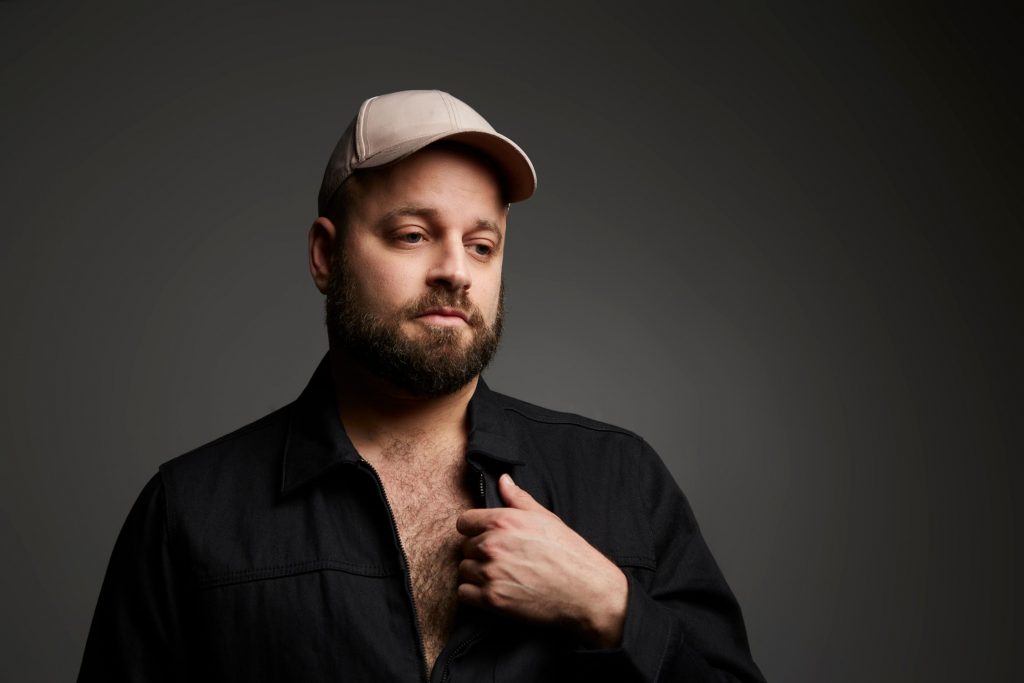Victor Esses is a Queer Jewish-Lebanese-Brazilian theatre maker, writer and performer who looks at the difficult aspects of our lives and makes them seem more manageable. His newest show, The Death and Life of All of Us is a story of intergenerational shame, family secrets and history which has been in the making for 20 years, and now, it’s ready to be told. We got in touch with Victor to learn more, ahead of his UK Tour.
Tell us about The Death and Life of All of Us; what can audiences expect from the show?
The Death and Life of All of Us is a multimedia autobiographical show where I perform as myself. I’m on stage with a live musician called Enrico Aurigemma. It has projection and moments of storytelling but all very concise. The story begins with me finding out about my long-lost great aunt who moved from Beirut to Rome in the 60’s, and going to visit her when I was 19. It explores my relationship with her – I come from a Jewish family, but she converted to Christianity and never told her children about her true identity. I interviewed her about her life to make a documentary about, which I only just about completed 20 years on. It examines these intergenerational relationships – that most of us have experienced with a grandma or someone – which tend to be a bit more forgiving than the relationships you have with your parents who raised you, and [The show] talks a little bit about that, about this connection. We don’t really go deep into analysing things it’s just a very emotional warm funny show and I hope that we can connect to as many people out there as possible.
When you say ‘more forgiving’ do you mean acceptance of this difference between you and that that gap kind of serves as a bridge?
Yes, because I can’t blame my grandmother and my great aunt for the way they raised me because they haven’t. Also though, it’s a bit more forgivable to be homophobic in that generation and to have these old-fashioned ways of thinking when maybe they didn’t have enough tools at the time to work with.
There are strong themes of self-acceptance in the show; was discovering your great aunt’s story a catalyst to achieving that for yourself?
Yes absolutely. In my teens to my early 20’s is when I came into my queerness and started discovering myself, and my place in the world. Having grown up in a very religious, conservative community, I was looking for a way out, to belong somewhere else. We are a very small, specific community – a Jewish community of people who came from Syria and Lebanon. Growing up, my parents spoke Arabic, we ate different foods, and we didn’t deviate from that very much. Finding out then, that my grandmother’s sister had made a whole different life for herself – whether she made a good choice or not – was very curious to me. What’s on the other side, or what’s not.
What makes now the right time to tell the story?
I think everything, like the times we live in where we can be more open, so I can talk about being Middle Eastern as well as Brazilian as well as Jewish as well as queer. I’m also mature enough now to embrace the complexities of everything because she has an interesting life-story, but there are also lots of things I don’t understand, she was full of contradictions, as we all are as humans. She was very camp, for example, but she would make homophobic comments.

This show involves themes of shame being passed down through generations, do you think that ends with us?
I wish it did. I think it depends on the works some of us do but then I could have a child tomorrow who embraces all the religious shame again. When I grew up, I thought the world just moved forward and we just keep progressing and making more achievements and getting rid of all the shame and bad stuff, but I learned that its more complex than that. People were more open in the 60’s and 70’s – certain people, not everyone – then when I was growing up in the 80’s and 90’s, it felt very conservative throughout.
How do you hope that The Death and Life of All of Us makes the audience feel?
I hope that the show makes people question things about their families and about themselves. That it opens up an interest to think more about how we present ourselves to the world and to embrace more of the complexities of it all. I think the more we are open to talk about this thing, the more productive it can be. We can get to know a bit more about the diffident cultures, and maybe see themselves on stage and see that its ok to say all these things out loud and to be an individual. Even the queer culture has its own kind of pitfalls in terms of what kind of queer person we are allowed to be within the community. I believe that this show offers an emotional journey and allowing people to connect in a personal way.
The format of your show is an interesting one, with an art installation, and choreography. What do you think this immersive stage presence lends to the story?
It invites you into a space that is different from the streets you came from and you’re right it allows you to immerse yourself into this different world, but one which you can feel safe in. It’s very precise in terms of visuals and creates a bit of an abstract space where we don’t need to tell stories that are complete.
Do you have anyone else at Fringe that you’re looking forward to seeing?
Yes, I am very much looking forward to seeing a show called Playing Latinx which is by a queer writer and performer called Guido Garcia Lueches which is about all the expectations on people who are born in Latin America and what is expected from them in the UK. It’s meant to be quite funny.

